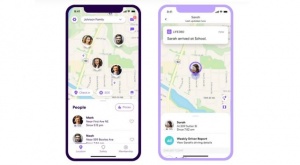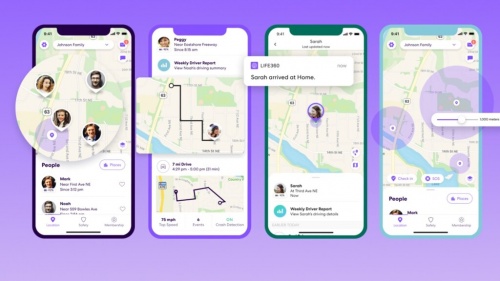Difference between revisions of "Life360"
(→Driving Safety) |
(→Digital Safety) |
||
| Line 34: | Line 34: | ||
===Digital Safety=== | ===Digital Safety=== | ||
| − | Life360 provides digital safety features such as data breach alerts, ID theft protection, stolen funds reimbursement, credit monitoring | + | Life360 provides digital safety features such as data breach alerts, ID theft protection, stolen funds reimbursement, and credit monitoring |
===Emergency Assistance=== | ===Emergency Assistance=== | ||
Revision as of 23:21, 10 February 2022
|
Life360 is a location sharing application developed in 2008 by Chris Hulls in the aftermath of hurricane Katrina as a response to locate family members in all circumstances.[1] The app has also been popularized and used to track the everyday movements of family members. There are various plans of membership available to users, ranging from free usage to a platinum membership for $19.99 per month[2], with the more expensive plans containing the most features. The app has faced many criticisms from users and professionals alike, and has updated and added various features to address those critiques. As a company, Life360 has also faced many accusations regarding how it uses user data, who they sell it to, and how those companies use the data.
Contents
History
Safety Features
Location Safety
Life360 users can share their location and see other Circle member's location at any given time. There are various push notifications users can set, such as drive notifications, low battery notifications, and place notifications. Drive notifications are sent when a person completes a drive and shows the user's top speed. Low battery notifications are sent to other users in the Circle to remind a specific user to charge their phone. Place notifications are sent when a user arrives or leaves from a given location. Location history is also a feature that allows users to view past trips and see a detailed history of how long member stay at given locations, as well as recurring routes. This feature is organized by day, and serves as a timeline of the Circle member's movements over time. In response to backlash, Life360 implemented a feature called Bubbles, which allows users to temporarily show their general location for a specified period of time while all other safety features are still activated. There is also an SOS feature, that allows users to send a silent alert to the other members in their Circle along with the emergency contacts listed if they feel unsafe or are in an emergency. Crime reports is another feature that allows users to see crime reports in a given area. There is a feature to turn off location sharing, however other members in the Circle will be able to see that the user disabled their location.[3]
The above image shows the interface of the app, and highlights some of its features.
Driving Safety
Driving safety features include crash detection, emergency dispatch, roadside assistance, family driving summary, individual drive reports. The crash detection feature senses collisions over 25 mph and reaches out to the user involved in the crash. In the event that the driver is unresponsive on the app, the app will send a notification with the users location to all the other members in the circle and their emergency contacts. With the Gold and Platinum plans, users can get roadside assistance with situations such as needing to jumpstart your car, towing and tire changes, and help with getting locked out of your vehicle. Another driving safety feature they advertise is the driving summary, which can show the combined statistics of everyone in the Circle and individual users. The driving summary includes statistics regarding phone usage, hard braking, rapid acceleration, and speeds exceeding 80 mph for a prolonged time. Life360 tracks drives and the various statistics by analyzing user location and speed.
Digital Safety
Life360 provides digital safety features such as data breach alerts, ID theft protection, stolen funds reimbursement, and credit monitoring
Emergency Assistance
Use of Data
Driving Trends
According to a PR Newswire article, Life360 analyzed driving behavior across their users and determined that a phone was used on average 1.78 times per drive [4]. It also provided the company with data to analyze where in the US cell phone usage during driving was the highest. The app tracks cellphone usage, hard braking, rapid acceleration, and the top speed during a drive. It
Ethical Concerns
Privacy Concerns
There are significant privacy concerns from users and critics of Life360. An article published by The Markup reveals that Chris Hulls confirmed that Life360 has "approximately one dozen data partners" which Life360 engages with in business transactions concerning user data.[5] One of the companies that buys data from Life360 is Cubeiq, which is a data company that supplies an analysis of data to help marketers gain a better understanding of their impact [6] Cubeiq has publicly revealed that they have partnered with various universities, such as Oxford University and Northeastern University, and the CDC to gain insight into mobility trends during the COVID-19 pandemic. In a statement by a Cubeiq spokesperson, the company confirmed that "the CDC only exports aggregate, privacy-safe analytics for research purposes, which completely anonymizes any individual user data".[7] However, many users concerns are with regards to the fact that their data is being sold for profit regardless of anonymity.
Another privacy concern with regards to data sharing is the fact that it is marketed as a family friendly app, which means that there are children who use it (with parental consent).[8] In the company's privacy policy, they state that they do not sell personal information of California consumers that are less than 16 years old[9], yet there is no specification for users under the age of 16 who reside in other states. The company also states that they do not share or sell personal information of users under the age of 13, regardless of where they live.[10]
Law Enforcement
One of the ethical concerns regarding user data is what companies or government agencies are able to purchase data from Life360. The Markup article[11] quotes Chris Hulls saying "From a philosophical standpoint, we do not believe it is appropriate for government agencies to attempt to obtain data in the commercial market as a way to bypass and individual's right to due process." Hulls clarified that in 2020, the company implemented a policy to prohibit any government agencies from using any data for law enforcement policies.
Profit Concerns
According to Life360's financial records as reported in their annual report, the data revenue for the years
User Critiques
Most of the critiques of the app come from children whose parents use Life360 to track their movements. A Washington Post article[12] reported multiple claims made by anonymous users regarding Life360 and how those user's parents use it to track their movements. One user claimed that his very religious and conservative parents forced him to download Life360 after he came out to them as gay. Another user claimed that his parents would call him whenever they saw something on the app that concerned them or that they didn't like.
Identity Verification
In Life360s company policy[13], they include a section on possible identity verification requirements in order to verify age and parental consent for a minor to use the app. In this scenario, the adult user is prompted to upload an image of themselves along with a photo of a valid government-issued ID which is then subject to machine learning tools and optical scans in order to verify their identity. According to an article published by the Alan Turing Institute[14], racial biases in facial recognition technologies arise when the sample of images used to train the algorithm is not an accurate representation of the demographic the program is used by. Therefore, various facial recognition programs are heavily skewed to be more accurate for men with lighter skin, as those demographics are the most represented in the training datasets.
References
- ↑ https://www.proquest.com/docview/1814124961/fulltextPDF/778E6C6B65D1440CPQ/1?accountid=14667
- ↑ https://www.life360.com/plans-pricing/
- ↑ https://www.life360.com/location-sharing/
- ↑ http://www.prnewswire.com/news-releases/life360-driving-behavior-data-reveals-distracted-driving-trends-across-america-300431593.html
- ↑ https://themarkup.org/privacy/2021/12/06/the-popular-family-safety-app-life360-is-selling-precise-location-data-on-its-tens-of-millions-of-user
- ↑ https://www.cuebiq.com/about/
- ↑ https://themarkup.org/privacy/2021/12/06/the-popular-family-safety-app-life360-is-selling-precise-location-data-on-its-tens-of-millions-of-user
- ↑ https://themarkup.org/privacy/2021/12/06/the-popular-family-safety-app-life360-is-selling-precise-location-data-on-its-tens-of-millions-of-user
- ↑ https://support.life360.com/hc/en-us/articles/360043228154-Full-Privacy-Policy
- ↑ https://support.life360.com/hc/en-us/articles/360043228154-Full-Privacy-Policy
- ↑ https://themarkup.org/privacy/2021/12/06/the-popular-family-safety-app-life360-is-selling-precise-location-data-on-its-tens-of-millions-of-user
- ↑ https://www.proquest.com/docview/2307898262/7BED54C1E15944CFPQ/2?accountid=14667
- ↑ https://support.life360.com/hc/en-us/articles/360043228154-Full-Privacy-Policy
- ↑ Leslie, D. (2020). Understanding bias in facial recognition technologies: an explainer. The Alan Turing Institute. https://doi.org/10.5281/zenodo.4050457

